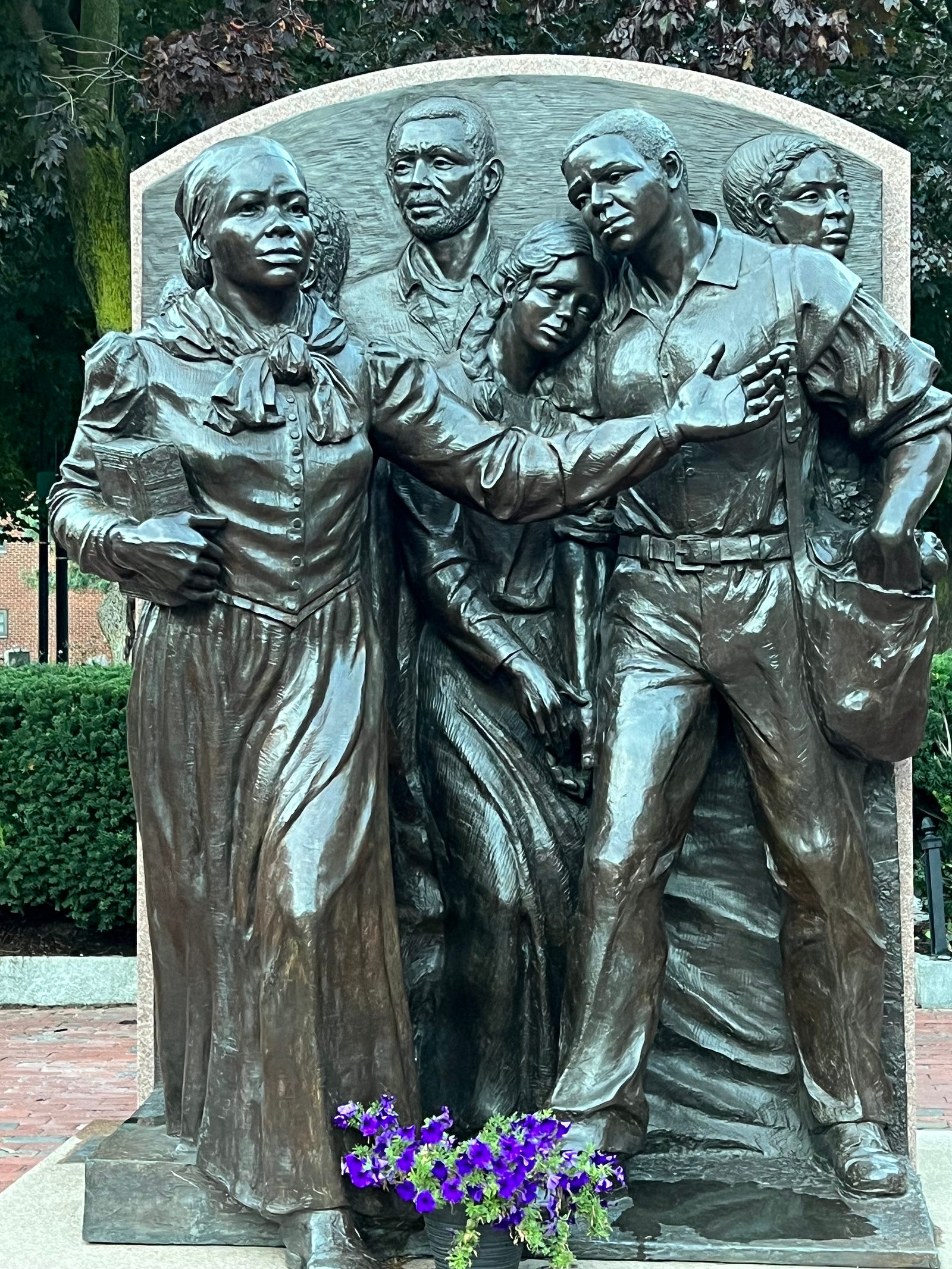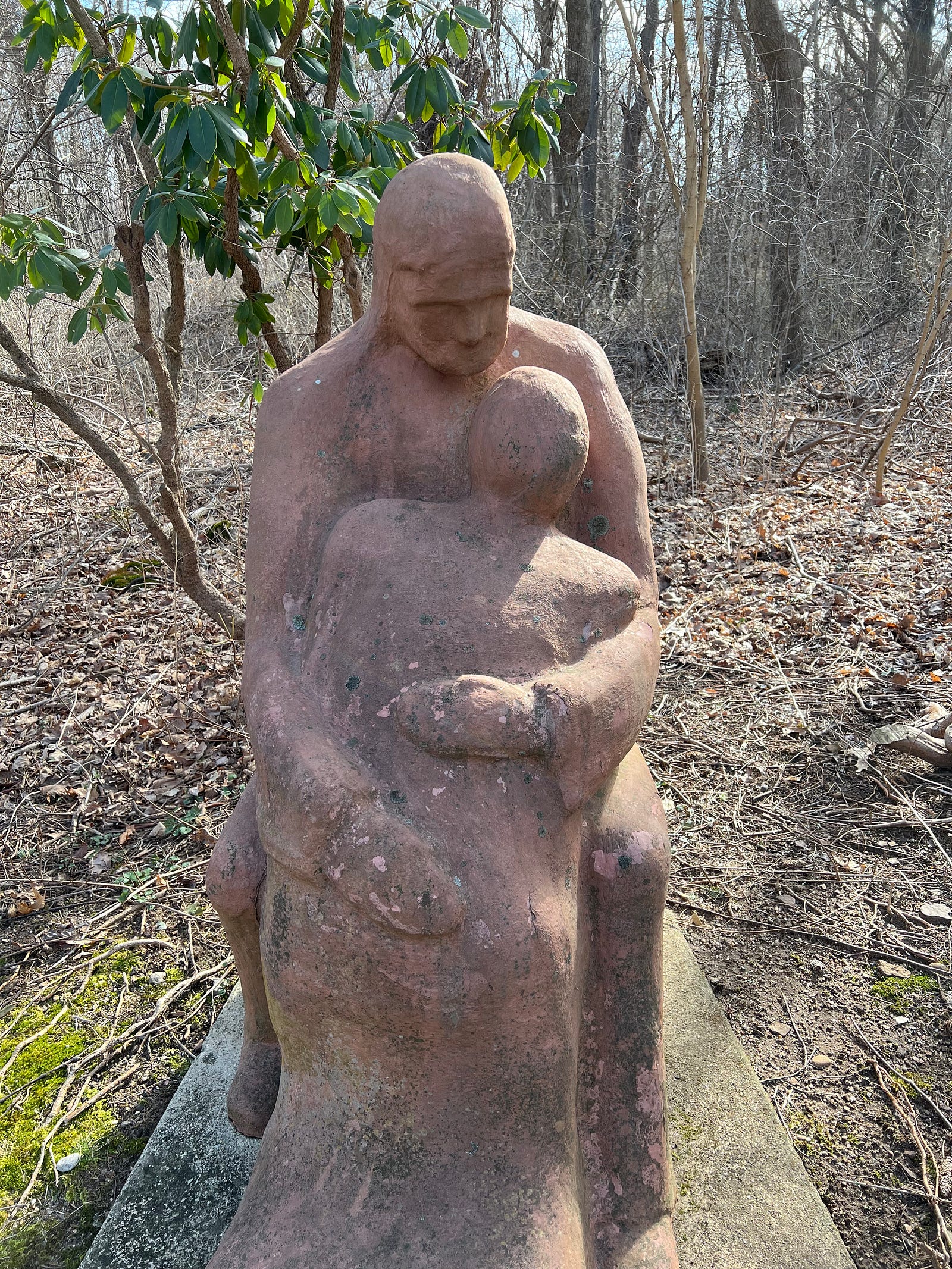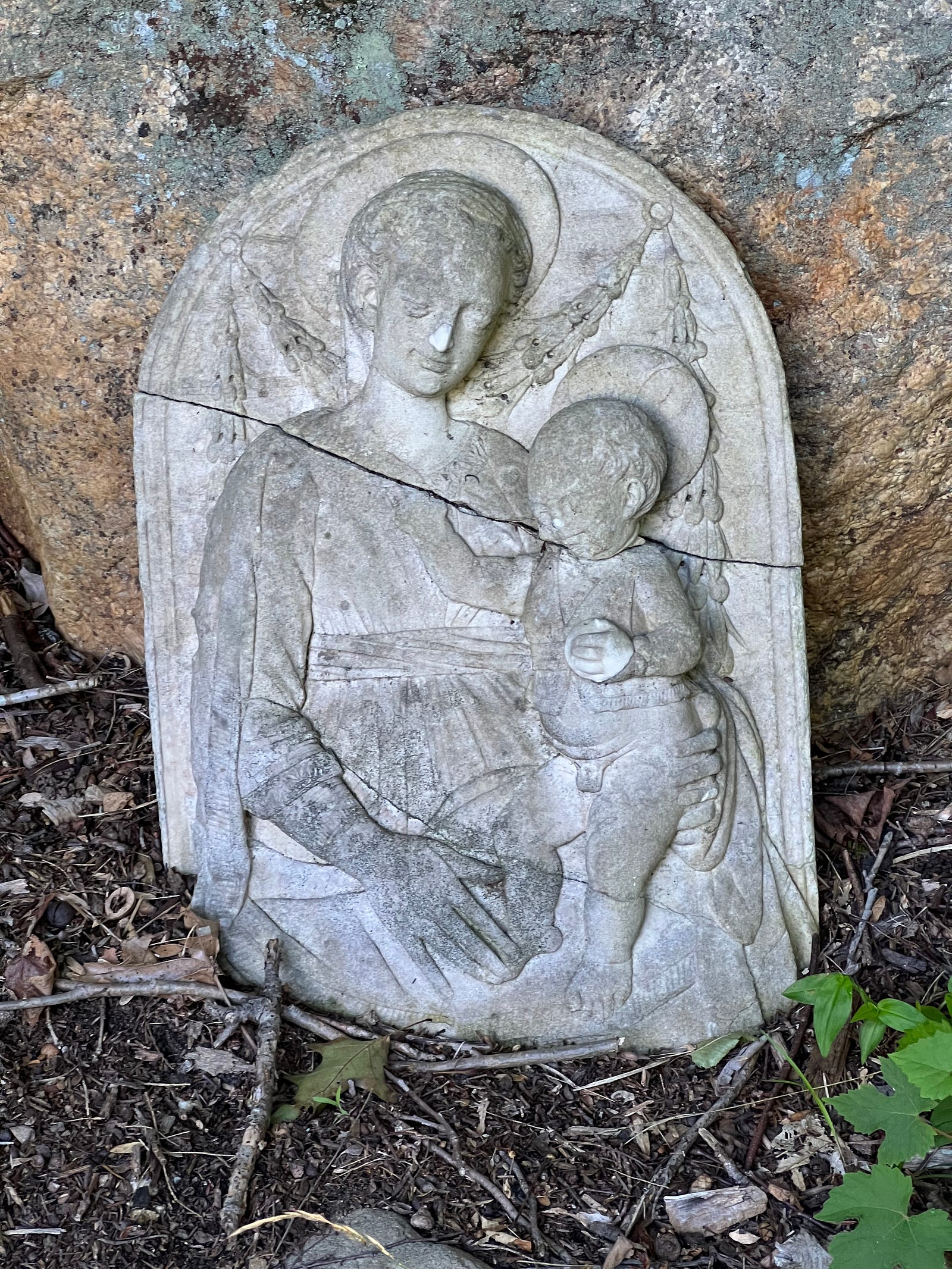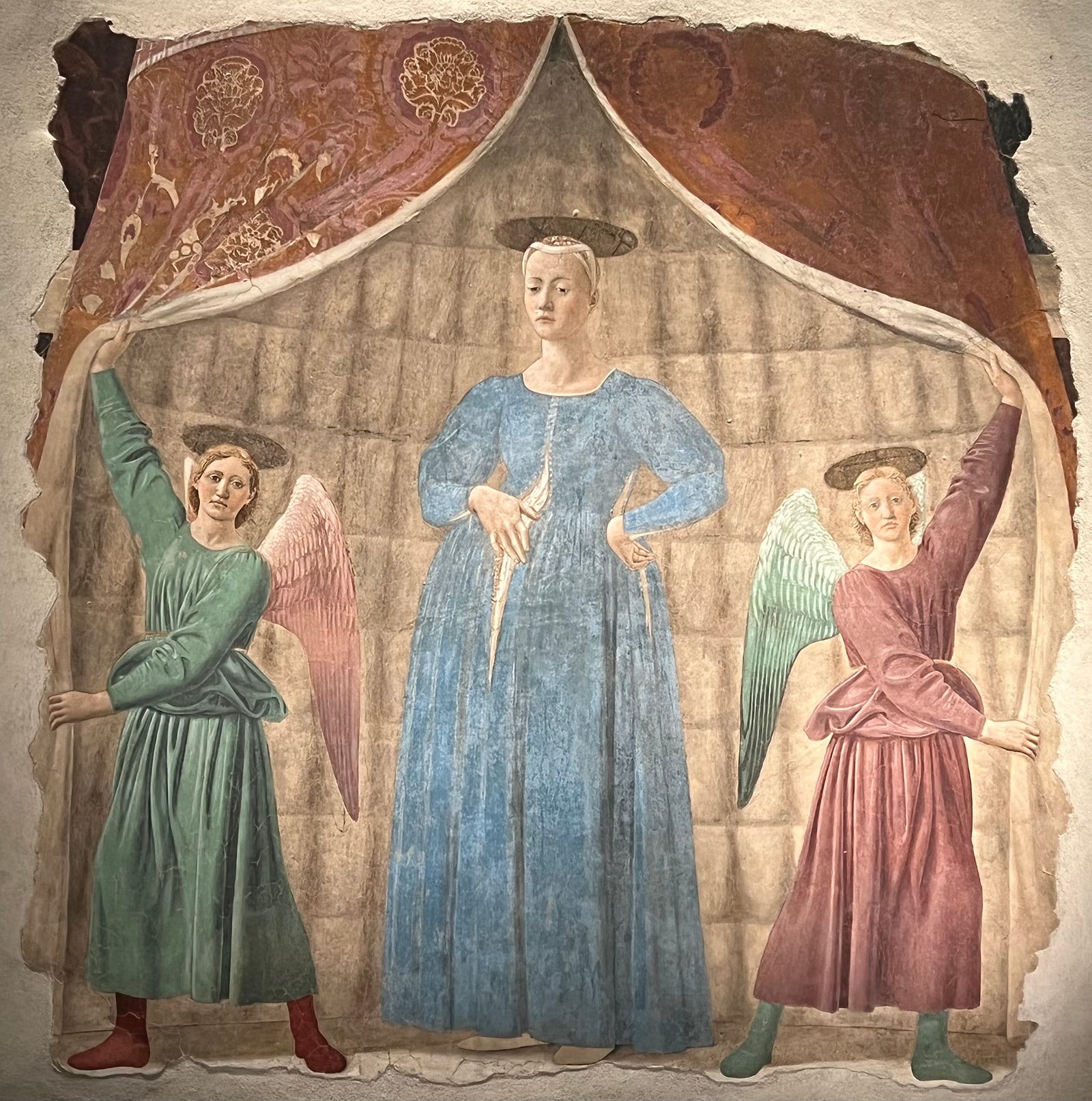Sermon: A Longing and an Ache
Published by Ronald Steed,
Who do YOU say that Jesus is?
Sermon: A Longing and an Ache
St. Andrews Episcopal Church, Madison, CT ¹. Taken from Exodus 1:8–2:10 (NRSV) & Matthew 16:13–20 (NRSV)²

A baby found among the reeds sets things in motion | Photo by Ron Steed in Bar Harbor, ME
Powerful Women
The People of Israel, enslaved in Egypt, had a longing and an ache… a longing to be saved from slavery and an ache to be their own people.
This morning’s story from Exodus¹ about the rescue of Moses from the Nile river seems like one that could be heard on the news today. It’s about a powerful national leader who is threatened by people who were not like him. And because the principle tool that powerful leaders have is death, that’s what he decrees. The recent stories of floating razor-saw barriers in the Rio Grande, and the apparent assassination of a rival Russian warlord are current-event parallels perhaps.

A leader led by love instead of death in our own times. Harriet Tubman memorial, the first memorial erected in Boston to a woman on city-owned property. | Photo by Ron Steed in Boston, MA
It is a story about women, powerfully exercising their own judgements in the face of oppression; of courageous and disobedient midwives, and of a mother in agony over the real possibility of losing her child to someone’s fear-driven national policy, and of a watchful sister who networks her contacts. The irony of the story, is that the leader’s own daughter, hearing the baby cry, "took pity on him", becoming herself, the lynchpin that brought salvation to the Hebrews in defiance of her father.
A Mysterious Source of Hope
Much of the Hebrew testament follows, as God’s chosen and rebellious people navigate their way in covenant with God over maybe 1000 years of existence as a people, including a disastrous re-enslavement and exile from Judea to Babylon.
It was in Babylon that they redacted and edited much of the Bible as we know it today, to give meaning to their exile and hope for their future. Some of that hope was centered on a mysterious servant-Messiah, who would figure in their renewed longing and ache. Even after they were permitted to return in joy to Judea, it seemed over the next 500 years that God was absent, and that their exile continued as successions of new oppressors from Alexander the Great to the Romans came to rule over them.
To BE Israel’s messiah was not well-defined; there wasn’t a job description. It COULD mean a lot of things to the Jews of Jesus’ time, but typically, the Messiah was expected to do at least three things:
- First the Messiah would become Israel’s King, like King David was in ancient times. You can see why Jesus would want this keep that a secret. It was good news that the people thought he was merely a prophet… prophets might not be as threatening to those in power, although John the Baptist’s head ended up on a serving platter. But to claim to be the Messiah was a very different matter. Israel already HAD a King (Harod), who was subservient to Caesar, and neither of whom was really interested in a rival. Even the Jewish leaders and priests felt threatened by Jesus’ claim. They hoped and expected that a more controllable Messiah would rise from their own lot rather than an uncontrollable nobody from some backwater village in Galilee. Jesus was crucified over his claim to be the Messiah in the end, with the inscription "King of the Jews" hanging over his head. His crowning really looked like defeat for Jesus and victory for the powerful. Death is THEIR tool after all.
- Second, the Messiah would be instrumental in the defeat of the enemies of Israel, namely the Romans and the Roman-appeasing King Herod. This is why there is a recurring thread of misunderstanding by Jesus’ disciples and the crowds who were expecting Jesus to raise an army. Ironically, Jesus DID defeat these powers by being crucified by them. Nobody was expecting THAT!
- And third, the Messiah was to usher in the return of God to Israel, who seemed to have been largely absent since Israel’s return from Babylonian exile 500 years before.

Messiah; man or God? | Photo by Ron Steed at Holy Family Retreat Center, West Hartford, CT
Human or Divine?
Now to the Jews of Jesus’ day, Messiah did NOT mean "second person of the Trinity"… Messiah did NOT imply divinity. "Messiah" carried a sense of being God’s right-hand-man. Further, the title "Son-of-God" ALSO did not mean divine. "Son-of-God" could and did mean "The People of Israel" as God’s chosen nation, and it could also mean the Messiah as the one embodying the People of Israel. So, there was God working together with the Son of God, God’s right hand man, to do God’s work.
The Messiah was special, chosen, anointed, seen as a son in some way, but definitely human and certainly not divine. None of the others who claimed to be the Messiah, and there were many, before and after Jesus, claimed to be divine.
And YET, the things Jesus was doing; healing, forgiving, feeding thousands, walking on water, cleansing the temple; all these were things that God alone might be expected to do. So what Jesus was doing, seemed to have divine features that would matter when looked at in retrospect later.

The things Jesus did in his life carried a divine aspect that would be important later | Photo by Ron Steed at St Andrew’s Episcopal Church in Madison, CT
What is intriguing, is that nobody followed those other Messiah’s after their deaths. Death could only mean that they weren’t the Messiah after all.
Why was it different for Jesus then? What is it that turned Jesus from "human Messiah and Son-of-God" to "Second person of the Trinity"? After all, we St Andrew’s Christians are worshiping Jesus as God now… in this very moment. We are sitting here now because a child was fetched out of the water by a tender-hearted daughter 3000 years ago, and a Messiah came to bring hope to the people led by that child… and something incredible happened to that Messiah.
What Made Jesus Different?
What happened was resurrection… Jesus raised from the dead, which pointed powerfully back at his life as though to say "pay attention to what I said and did in life… there is something more to see there than you think."
And with that, early Christians began, very quickly, to realize that Jesus was more than a person who was venerated and admired as a human, but rather the Creator God itself who was to be worshiped.
It would take another 400 years for the church to find good-enough words to describe the Trinity in the Nicene Creed, but already in Matthew’s Gospel and in Paul’s letters, written within a generation or two of Jesus’ death, we begin to see that language powerfully take shape. And, we are seeing them draw that language from the Hebrew Scriptures, because within the Hebrew Scriptures are found the same stories of divine love; of rebellious midwives, grieving mothers, quick-thinking sisters, and rescuing daughters.
For Christians then, Jesus the Messiah, began to take on a divine nature that went beyond the broad Jewish concept of Messiahship, but was also fully consistent with the Jewish belief in one God. For early Christians, Jesus was God incarnated… God as one of us and WITH us… fully human AND fully divine. Born, lived, crucified, resurrected, ascended, and alive and active in the world to this very day, in the hearts those who sit in these very pews.
What He Did Gives Us Hope
So what does all this mean to us?
First, that Jesus did all the things that the Messiah was supposed to do to fulfill Israel’s destiny to be a light to the nations. AND, he did shockingly more… over the top more:
- He became the King of the Jews, as the sign on top of his cross proclaimed. And more, he was King of the Kingdom of God… a very different global, even cosmic kingdom, whose guiding principle is not death, but love. The kind of love that that causes midwives to disobey a pharaoh, that causes an agonized mother to set her child adrift in a fragile basket, and that causes a young woman to rescue a child whose cry touches her heart, and a sister brilliantly to make heart-to-heart connections, the kind of love that sends exiled people joyfully back home… the kind of love that Jesus had on full display throughout his life, the kind of love we see in operation all around us today if we have eyes to see, and the kind of love we feel in our hearts if our heads allow it to be felt.

The scandal of incarnation… God with us and within us. Photo of the fresco Madonna del Parto of Monterchi by Piero della Francesca (c 1460) | Photo by Ron Steed
- Second, he defeated the enemies of Israel, but that turned out not to be so much the Romans or the Herodians, but Evil… the real enemy… the force of anti-creation in the world. Evil was decisively defeated on the cross, but not yet destroyed. And that gives us co-creational, loving ACTION to take as we work together toward the fulfillment of God’s Kingdom, the model of which is the cross and the resurrection… the pattern we look for when we are looking for God.
- And finally, Jesus ushered in a new and fresh presence of God powerfully in the world, in ways that no one had imagined, because it turned out that Jesus was God itself. And THIS tells us a lot about who and what God is. When we are trying to figure out God, just look at Jesus and you will know; God is with us close at hand not far away, active not sleeping, always tugging at our hearts and never coercing, loving our true and authentic selves… what God joyfully made us to be.
It means is that we have hope:
- We have a creator God who knows what it is like to be human… God’s been where we are and powerfully IS where we are.
- We can listen for what God is telling us in the same way that Peter learned that Jesus was the Messiah… we can listen to our hearts. We can give up the idea that we can know Jesus with our heads. That’s part of what Jesus was telling his disciples… "you can’t know me that way, so stop it. Lean into me with your hearts like Peter just did, and you will learn".
- We can look for the longings and the aches in our hearts now… the places where WE are being crucified, and KNOW that the Messiah’s resurrection is where we will find respite.

We long and we ache in our own times | Photo by Ron Steed at Weekapaug Chapel, RI
Our Longing and Our Ache
Don’t we feel a longing and an ache for our own times? Don’t we long for peace, and wholeness, and meaning in our lives and in our communities? Don’t we ache to be freed from illness, and oppression, and hate? Do we feel like we are exiled from who and what we truly are as humans, by forces whose only tool is death? Don’t we want to be liberated from our complicity in these things? To forgive and to be forgiven? To embrace and to be embraced?
Don’t we long for a Messiah who will free us? One who will hear our cry and take pity on us?
Who do YOU say that Jesus is? What is God revealing about him in your own heart?
¹ This sermon was delivered at St. Andrews Episcopal Church, Madison, CT, in Ordinary Time, Proper 16, August 27, 2023.
² Readings: